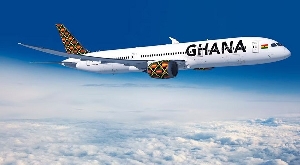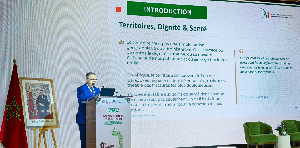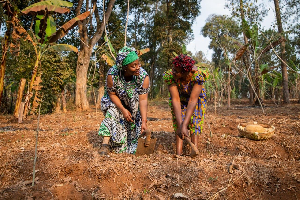Health News of Thursday, 28 August 2008
Source: GNA
Cancer Control Experts Meet
From Yaa Oforiwah Asare-Peasah, GNA special correspondent Geneva, Switzerland Courtesy: CHOCHO Industries/Newmont Ghana
Geneva, Aug. 28, GNA - Cancer is considered one of the most potentially preventable and curable among the chronic and life threatening diseases. However it is still a major cause of deaths worldwide.
Cancer, which is one of the emerging diseases in Africa, according to experts, occurs in about 200 types of diseases making a complexity of the cancer story, especially in the developing world, accounting for at least 72 per cent of the approximately eight million deaths worldwide. Experts say there are 11 million new cases each year and that cancer kills more than malaria, AIDS and tuberculosis. Records in Ghana are still scattered, according to official sources, as experts are feverishly building the database. However, some of the well known reported cases include lung, prostate, cervical, breast, stomach, liver, oesophageal (oesophagus) and leukaemia - common among children, according to hospital sources. These have wrecked the lives of the nation's important personalities over the years. For example, last year alone Ghana lost a prominent politician, a high profile personality in the judiciary, a student in the country's premier university and a cancer-free promoter who had established a foundation to promote cancer control in the country.
These deaths were the tip of the iceberg, due to the personalities involved, while majority of cases went unnoticed. It is in the wake of this menace and the need to control those needless deaths that thousands of people made up of cancer and tobacco control experts, volunteers, cancer survivors, care givers and the media from all over the world including Ghana are meeting in Geneva, Switzerland, to strategise on the means of addressing the global cancer and tobacco burden and the projected increase in cancer deaths worldwide.
The meeting is being organised by the International Union against Cancer (UICC) under the theme: "True Cancer Control" with supporters, including the American Cancer Society and European School of Oncology Foundation.
The week-long programme for the World Cancer Congress, scheduled for August 27-31 will among other things discuss tobacco control and the attending cancer menace.
The congress which opened on Wednesday seeks to bring together, governments, health professionals and cancer NGOs in the creation of national cancer plans that would promote a worldwide comprehensive and anti-cancer strategy, share information, make commitments and serve as the launch point for worldwide action in transforming state of the science into state of practice based on the economic implications of application strategies among other issues.
It will provide delegates with a milestone event promoting new data sharing and exchanging information in the global fight against cancer. The latest findings will be discussed as well as the challenges of implementing the knowledge in different resource settings. Key components would be the role of nurses and patient advocacy, public health, prevention including tobacco control, supportive and palliative care.
The rest are cancer research and treatment and capacity building while the scientific session includes cancer prevention and control, tobacco control, supportive care and capacity building. Addressing the opening ceremony on Wednesday night, Dr Margaret Chan, Director-General of the WHO said cancer control should be made a development priority since it contributed to poverty and other financial constraints.
She said the disease had become a community problem because it brought a toll on the financial resources of affected people and their families.
"Unfortunately no country in the world is doing enough to control cancer," Dr Chan said adding that the worst hit were the developing countries which had come face-to-face with its attendant problems that should have been shared by the global world." Franco Cavalli, UICC President, said cancer respected no borders and affected all directly or indirectly. Therefore the meeting had a key role in building partnerships across countries, organisations and disciplines and advancing the conquest of cancer in every country. "Together we can move the global cancer agenda forward and bring hope to millions," he said, and adding that it was designed to embrace everyone involved in cancer control from research to treatment and cure and from prevention to palliative care.
"In the 75 years of UICC, the global cancer control community has grown dramatically and the UICC is proud to count among its members the world's leading cancer research institutions, treatment centres, voluntary cancer leagues and societies, patient-support networks and advocacy groups and some Ministries of Health in some countries." The opening ceremony was also addressed by Dr Tabare Vazquez, President of Uruguay and Mr Pascal Couchepin, President of the Swiss Confederation. Side attractions include photo exhibitions of cancer care and medical advances in cancer research, management and treatment. The Komfo Anokye Teaching Hospital (KATH) and the National Health Research Unit (HRU) of the Ghana Health Service are participating in the exhibition. Dr Baffour Awuah, a specialist Radiation Oncologist at the KATH and Mrs Edith Wellington of the HRU are leading the Ghanaian teams. 28 Aug. 08












